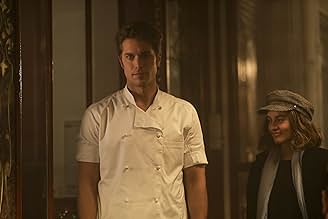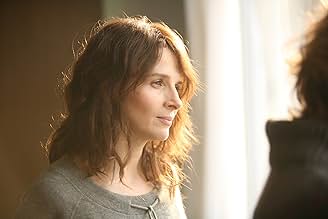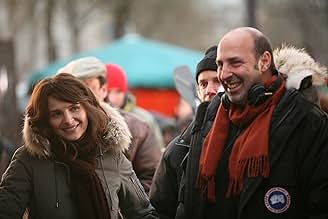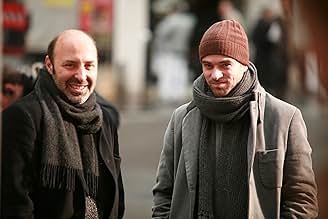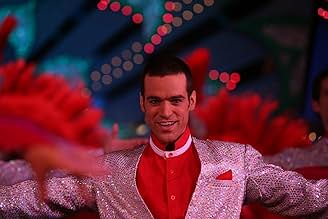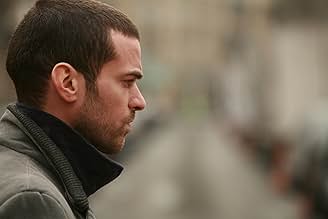Paris
- 2008
- Tous publics
- 2h 10m
IMDb RATING
6.8/10
13K
YOUR RATING
A ex-dancer has a heart problem and even with a transplant, he may still only have a few months to live. Time's spent looking at people/life in Paris from his balcony. His single mom sister ... Read allA ex-dancer has a heart problem and even with a transplant, he may still only have a few months to live. Time's spent looking at people/life in Paris from his balcony. His single mom sister moves in with her 3 kids to look after him.A ex-dancer has a heart problem and even with a transplant, he may still only have a few months to live. Time's spent looking at people/life in Paris from his balcony. His single mom sister moves in with her 3 kids to look after him.
- Awards
- 4 nominations total
- Director
- Writer
- All cast & crew
- Production, box office & more at IMDbPro
Featured reviews
No one, but no one, makes movies that better capture a sense of place than Cedric Klapisch. Since the miraculous little When the Cat's Away (Chacun Cherche son Chat, 1996) he's consistently been able to evoke a real sense of lived lives and inhabited city spaces. Wonderful then, to discover that after all the travels of The Spanish Apartment (2002) and Russian Dolls (2005) he's returned to Paris to make one of the best films ever made of those little universes within the City of Light. That said if you know nothing about France or its history and culture you just won't get it!
The hook on which this multidimensional movie hangs is Pierre (Klapisch favorite, Romain Duris), a professional dancer who's justlearned that his heart is failing. A transplant may save him, maybe not. All this has echoes of the great Agnes Varda film, Cleo de 5 a 7 (1962), where Cleo, a young singer played by Corinne Marchand, also gets a frightening diagnosis and she too, walks the streets of the city facing her own death. Maybe Paris (the film) achieves even more as a kind of aubade or farewell to the dance of life that ceaselessly crosses Paris (the city) in time and in space.
The centre of the film is Pierre's sister Élise (Juliette Binoche in her most relaxed and charming performance in years). Elise moves in with Pierre (along with her children!) to help out and her own little adventures as she shops at the local market opens out the film as we discover the complex and many layered live of the market workers, especially glum Jean (Albert Dupontel) and his soon to be ex wife Caroline (Julie Ferrier).
Another story thread follows terminally bored history professor, Roland Verneuil (Fabrice Luchini) embarking on a new career as a TV pundit: these scenes are beautifully satirical yet also curiously touching.
Among the many delights of the movie is a great dream scene where Roland's brother, architect Philippe Verneuil (François Cluzet) is plunged into the 3D Universe used to sell off one of his middle class housing Projects and floats like a tormented Mario Brother from some gleaming modernist disaster to rapturous potential buyers and back again. This delicious scene goes on just long bought to make more than a few silly dreams of home improvement (let alone all those fantastical TV Reality shows) seem, as they are, utterly absurd , yet also quite nightmarish in their silly faith in problem solving by buying stuff. For this alone the movie's worth the price of admission!
Interwoven, too, is the story of the anxious young Benoit in Cameroon, adrift and about to try to join his Paris based émigré family in that most dangerous of ways, the open boat from Africa to Europe. All French life, it seems, is touched upon, not least the political morass facing governments as they grapple with the problem of the poor and dispossessed out in the projects. The music track is equally complex, with that old favorite (since Truffaut used it in Shoot the Piano Player almost fifty years ago!) Erik Satie's Gymnopedie Number 1 again weaving its extraordinary spell! You just have to be there!
Klapisch has done something marvelous here, a film full of ideas and humanity, yet one that somehow enables us to engage with and care for so many complex characters without ever having to resort to stereotypes. It's a great achievement and a glorious movie about that city to which we must all return in our dreams: Paris.
The hook on which this multidimensional movie hangs is Pierre (Klapisch favorite, Romain Duris), a professional dancer who's justlearned that his heart is failing. A transplant may save him, maybe not. All this has echoes of the great Agnes Varda film, Cleo de 5 a 7 (1962), where Cleo, a young singer played by Corinne Marchand, also gets a frightening diagnosis and she too, walks the streets of the city facing her own death. Maybe Paris (the film) achieves even more as a kind of aubade or farewell to the dance of life that ceaselessly crosses Paris (the city) in time and in space.
The centre of the film is Pierre's sister Élise (Juliette Binoche in her most relaxed and charming performance in years). Elise moves in with Pierre (along with her children!) to help out and her own little adventures as she shops at the local market opens out the film as we discover the complex and many layered live of the market workers, especially glum Jean (Albert Dupontel) and his soon to be ex wife Caroline (Julie Ferrier).
Another story thread follows terminally bored history professor, Roland Verneuil (Fabrice Luchini) embarking on a new career as a TV pundit: these scenes are beautifully satirical yet also curiously touching.
Among the many delights of the movie is a great dream scene where Roland's brother, architect Philippe Verneuil (François Cluzet) is plunged into the 3D Universe used to sell off one of his middle class housing Projects and floats like a tormented Mario Brother from some gleaming modernist disaster to rapturous potential buyers and back again. This delicious scene goes on just long bought to make more than a few silly dreams of home improvement (let alone all those fantastical TV Reality shows) seem, as they are, utterly absurd , yet also quite nightmarish in their silly faith in problem solving by buying stuff. For this alone the movie's worth the price of admission!
Interwoven, too, is the story of the anxious young Benoit in Cameroon, adrift and about to try to join his Paris based émigré family in that most dangerous of ways, the open boat from Africa to Europe. All French life, it seems, is touched upon, not least the political morass facing governments as they grapple with the problem of the poor and dispossessed out in the projects. The music track is equally complex, with that old favorite (since Truffaut used it in Shoot the Piano Player almost fifty years ago!) Erik Satie's Gymnopedie Number 1 again weaving its extraordinary spell! You just have to be there!
Klapisch has done something marvelous here, a film full of ideas and humanity, yet one that somehow enables us to engage with and care for so many complex characters without ever having to resort to stereotypes. It's a great achievement and a glorious movie about that city to which we must all return in our dreams: Paris.
I saw this flick yesterday, and I have to say that I loved it. I am a big fan of Klapisch earlier work( Le peril jeune, Peut etre, chacun cherche son chat,...), but I am yet to see Russian dolls and the Spanish apartment.
I have found this movie in line with the other movies. Not frankly funny, but not only depressing. I thought that all characters are driven by one main emotion, which categorises them into the different stereotypes of Parisians: The intellectual, the artist, the grocer, etc. I have found hard to identify to only one, but rather you can connect with all of them at the same time. I have found out that all of the characters are, in fact, Paris, and I loved the movie for it. Klapisch is a great director and has always been able to capture a lot of complex emotions on camera. I have to say that he did it again in this opus.
His big talent is that he is able to make us reflect on our own lives through trying to understand his characters, and I guess that is why some people did not particularly like this movie as they were forced to have an inside look, but personally, I find it a great exercise.
The photography, avoiding clichés, is great and shows a different side of Paris. It is showing the Paris where people live, and not particularly where people holiday in.
All in all, a great performance by the whole cast and crew. Thanks again mister Klapisch!!!
I have found this movie in line with the other movies. Not frankly funny, but not only depressing. I thought that all characters are driven by one main emotion, which categorises them into the different stereotypes of Parisians: The intellectual, the artist, the grocer, etc. I have found hard to identify to only one, but rather you can connect with all of them at the same time. I have found out that all of the characters are, in fact, Paris, and I loved the movie for it. Klapisch is a great director and has always been able to capture a lot of complex emotions on camera. I have to say that he did it again in this opus.
His big talent is that he is able to make us reflect on our own lives through trying to understand his characters, and I guess that is why some people did not particularly like this movie as they were forced to have an inside look, but personally, I find it a great exercise.
The photography, avoiding clichés, is great and shows a different side of Paris. It is showing the Paris where people live, and not particularly where people holiday in.
All in all, a great performance by the whole cast and crew. Thanks again mister Klapisch!!!
A wonderfully complex study of both the city, and it's people on a wonderfully complex group of characters. Every one was as interesting as any other, regardless of the stature of the actor playing them, and you were invested in them all because of it. Juliette Binoche and Albert Dupontel were the most familiar names to me, but their characters were not allowed to dominate the story.
All along the way you were taken on journeys that were unsignposted and shocking, in some cases, because of it.
A quite extraordinary tale that deserves a far wider audience than it is likely to get. Overall the film was a shining example, in my opinion, of what makes French cinema the best in the world.
All along the way you were taken on journeys that were unsignposted and shocking, in some cases, because of it.
A quite extraordinary tale that deserves a far wider audience than it is likely to get. Overall the film was a shining example, in my opinion, of what makes French cinema the best in the world.
Being a Parisian myself, and a great fan of all other Klapisch movies, I expected a lot about this one. Well, I was pretty satisfied: although it is no masterpiece, the global atmosphere, and especially the gorgeous views of the city are very well put together. The actors are very convincing too, especially Juliette Binoche, radiant, Luchini, a surprisingly good dancer, and Albert Dupontel. It is just a pity that there are so many simultaneous stories, some of them don't really bring much to the plot and could have been cut, to leave more time to the others.
Anyway, I recommend this movie for all people who want to get a feel for what Paris is all about!
Anyway, I recommend this movie for all people who want to get a feel for what Paris is all about!
...if Klapisch hadn't wasted his time on all the plot threads that run through this over-long film. From Karin Viard as the bakery owner with her new helper Sabrina Ouazani, to the overly macho fruit and veg guys (Albert Dupontel, Zinedine Soualem and Gilles Lellouche) with their supermodel day-trippers, there is just too much material for the modest little picture that this really is. Klapisch, I guess, wants to be the Balzac of today's French cinema, and he has much talent--I enjoyed Chacun Cherche son chat and L'Auberge espagnole--but he must be more selective in telling his stories.
I took away from this exercise the performances of Fabrice Luchini, the history prof who decides to go into TV work when the fabulous salary is dangled before his eyes (100,000 euros a year!) and François Cluzet as his harried brother, an architect working on a nightmarish housing development (the computerized promotion film of which is one of the highlights of 2008). Honorable mention to Julie Ferrier as the ex-wife of one of the fruit vendors.
I took away from this exercise the performances of Fabrice Luchini, the history prof who decides to go into TV work when the fabulous salary is dangled before his eyes (100,000 euros a year!) and François Cluzet as his harried brother, an architect working on a nightmarish housing development (the computerized promotion film of which is one of the highlights of 2008). Honorable mention to Julie Ferrier as the ex-wife of one of the fruit vendors.
Did you know
- TriviaAs end credits conclude, the choreographed dance show with Pierre shown earlier has a brief repeat.
- GoofsWhen the shop-owner of the bakery sell a baguette she asks for 80 cent, doesn't register it in the till, which has the figures 0,00 than it changes to 0,78 than back to 0,00 again.
- SoundtracksMunivers de Paris
Written by Robert Burke (as R. Burke) and Loïc Dury (as L. Dury)
Performed by Kraked Unit
Universal Music Publishing
MGB / Kraked - ce qui me meut production
- How long is Paris?Powered by Alexa
Details
- Release date
- Country of origin
- Official site
- Language
- Also known as
- Париж
- Filming locations
- Production companies
- See more company credits at IMDbPro
Box office
- Budget
- $12,000,000 (estimated)
- Gross US & Canada
- $1,010,194
- Opening weekend US & Canada
- $46,518
- Sep 20, 2009
- Gross worldwide
- $23,328,518
- Runtime
- 2h 10m(130 min)
- Color
- Sound mix
- Aspect ratio
- 2.35 : 1
Contribute to this page
Suggest an edit or add missing content


